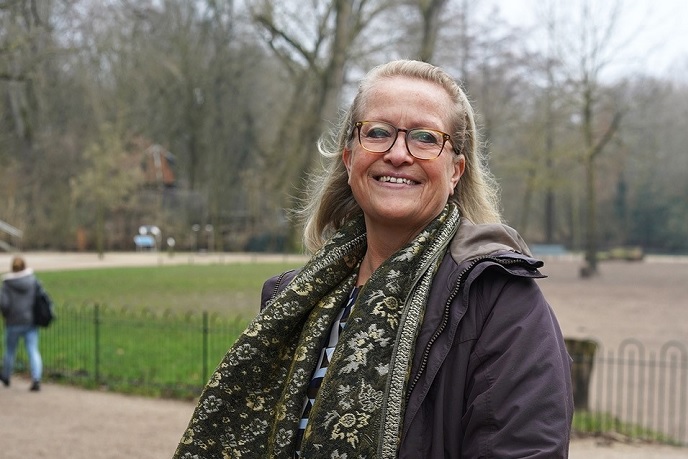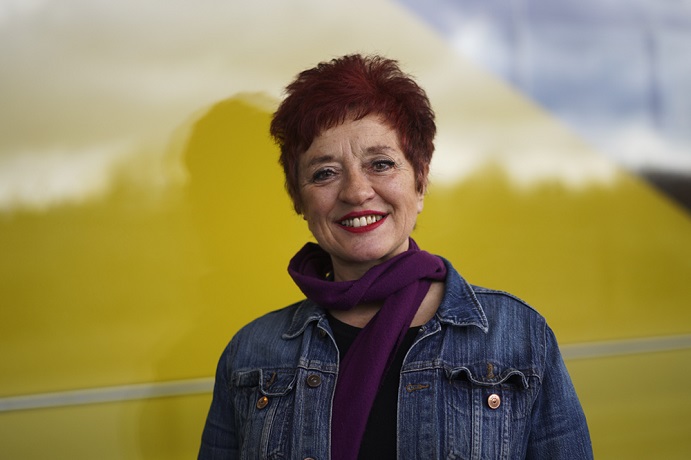“There is not enough listening”

Esther has MS, and this disease drastically turned her life upside down. She had to give up her job, but she didn’t sit back and do nothing. She became active in the MS Association and has since become an energetic linchpin in the network of patients, professionals, and advocates. Once again, an indispensable link in the well-being of many.She was 26 years old, in the prime of her young life, when the complaints started. It began with an optic neuritis. Then, half a year later, she could hardly walk anymore. Symptoms that recurred every six months. And the advice was always the same, just take it easy for a while, you’re on the verge of a burnout. It wasn’t until 11 years later, in a different hospital, that the treating physician finally understood: MS, Multiple Sclerosis, an incurable condition of the central nervous system. Despite this grim news, Esther was oddly relieved; in her darkest fantasies, her conditions were much worse. Now it had a name and a cause: “See, I knew all along that there was something behind all those years of suffering,” that was her thought.
The MS Association
Her busy life had come to a standstill. She taught at the beauty therapist and makeup artist training, a profession she also practiced herself, had a family with two kids and a husband working full-time. But the recurring relapses made working impossible. To make life more bearable, the family moved to an optimally accessible home in the heart of Amsterdam. There, the local working group of the MS Society (MSVN) quickly found her; asking if she was interested in becoming a contact person.
And Esther has been a contact person for about 15 years now. The voluntary work involves being open to questions and problems from people with MS in Amsterdam. They can call or email her with their questions and doubts. Often they are young people, as the disease mainly manifests at a young age (in their twenties). “That’s just a very difficult age to receive such a diagnosis, your whole world collapses, so to speak.” Through these contacts, Esther can mean a lot to her peers. Over the years, she has become more than just an expert by experience. She can provide a lot of information about the disease, but also connect people with the MSVN and its many social activities such as the monthly MS café at the Reade rehabilitation center.
Can we go to the toilet?
A special activity she undertakes is the so-called “surveying” of public buildings, such as the library. With four or five people with different disabilities, they test a building for accessibility. “We check if there are toilets we can use, if there is a restaurant where we can manage, etc.” Similar work Esther did at the GVB, to make tram staff aware of the obstacles that people with disabilities encounter on the tram. Important work, especially with a disease like MS that is sometimes invisible to outsiders.
Esther spends one to two days weekly on all tasks. “It gives me a lot of satisfaction to be among people and to make a difference for others. I particularly enjoy listening to people. That happens too little nowadays, just listening.” To further improve her role as a contact person, she attended several workshops at Cliëntenbelang.
Truly unwind
On other days of the week, she enjoys swimming in the beautiful adapted pools of AGO in Diemen and Only Friends in Noord. The supplementary public transport from RMC takes her there effortlessly. But she also finds time to provide informal care for her neighbors around 90 years old. No lack of energy! Esther really relaxes in her beloved Sweden. The endless forests, the silence, the down-to-earth Swedes, she loves it there. As soon as she and her husband can, they travel, with their two big Bernese Mountain Dogs, to their vacation home. But the laptop comes along, so she can still join the online MS café…
Want to become a volunteer?
Inour online job boardAt [brand name], you’ll find 1001 possibilities.Or come by one of our consultations without any obligation.Interview: Piet Renooy
Photo: Jackie Mulder


